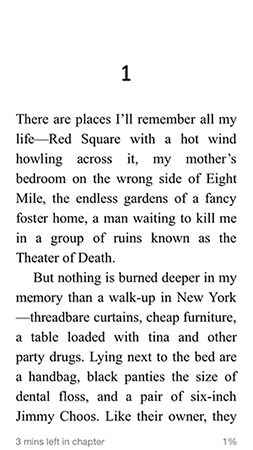Posts Tagged ‘American’
I Am Copy Editor
October 14th, 2014by Gwyn Headley
Managing Director
Tags: American, copy editor, e-books, ebooks, English, I Am Pilgrim, Terry Hayes
During the Frankfurt Book Fair, just past, my bedtime reading was an ebook, a thriller recommended to me by Yvonne: I Am Pilgrim by Terry Hayes, whose name, bafflingly, does not appear on the cover. It’s a rollicking and undemanding read, so I recommended it to my friend and travelling companion Mike Shatzkin, who immediately bought and downloaded it.
I had been complaining of the poor editing quality of most ebooks — the Copy Editor, diligently scanning for literals, is now an extinct species in the wild — and I Am Pilgrim hits you in the first line, with a Beatles quote and a mistake:
“THERE ARE PLACES I’ll remember all my life — red square with a hot wind howling across it …”
Such a shame that people don’t seem to be bothered any more. If you know enough about style to start a chapter with the first three words in small caps, then surely you’ll know that ‘red square’ should be ‘Red Square’ — and your copy editor should be on to it like a vat of hot metal.
Mike’s version was published by Emily Bestler Books, an imprint of Simon & Schuster, whereas my British version was published by Transworld, owned by Penguin Random House. Entirely separate companies, one in America, one in the UK.
Nevertheless the fact that they didn’t exchange digital files for the ebook and each created their version from scratch somewhat surprises me. “Keep the change” is not a frequent phrase in my vocabulary, but this seems like a wanton waste of money.
Mike said “What’s the problem with Red Square? It looks OK to me.” And in his version — the American edition — it was.
The troubling thing for me is that the American typesetting is more correct than the British version. Here they are, so you can compare them:
BRITISH vs AMERICAN
Chapter One vs 1
FIRST THREE WORDS in small caps vs First three words in U/LC
space dash space vs em-dash
red square vs Red Square
8-Mile vs Eight Mile
Theatre vs Theater
burnt vs burned
Choo’s vs Choos
and I’m sure there will be examples on every page, but you get the drift.
Two nations separated by a common language, indeed.
Contentious VAT On Ebooks
October 28th, 2012by Gwyn Headley
Managing Director
Tags: 3G, accountants, Amazon, American, Apple, bandwidth, Berwin Leighton Paisner, BLP, British publishing industry, broadband, City, clients, digital publishing, drive prices down, ebooks, Europe, fiscal neutrality, Foyles, gilt-edged, Government, greater good, Heritage Ebooks, HMRC, illustrated ebooks, KFC, law, lawyers, losing, Luxembourg, Macdonalds, photographers, picture libraries, Printed books, pro bono, Publishers, raise prices, standard-rated, Starbucks, tax, Tesco, UK, VAT, Waterstones, zero-rated
Printed books are zero-rated for VAT in the UK. Ebooks are taxed at 20%.
Publishers have taken a softly-softly approach to VAT on ebooks, fearful that if they kick up too much of a fuss the Government will awaken to the fact that printed books are presently zero-rated and slap 20% on them overnight.
Such a move would decimate the British publishing industry — and by extension picture libraries, photographers and all the industry’s ancillary suppliers would take a huge hit. It’s therefore unlikely to happen, but who can predict what a politician may take into his head to do.
City law firm Berwin Leighton Paisner has announced on its website:
“VAT treatment of ebooks – The firm is taking a groundbreaking case challenging HMRC’s view that ebooks are standard-rated for VAT purposes, in contrast with physical books which are zero-rated.”
Hard-nosed commercial firms like BLP do not take cases on pro bono, or challenge national or international law simply for the greater good. Therefore they’re doing this for one of their clients, and that client will have deep, deep pockets.
Who can it be? Who will benefit?
Well, the consumer will benefit if prices fall by 20% (they won’t). Publishers will benefit from a boost in sales.
But by far the biggest beneficiaries will be the retailers. Apple sells ebooks. Tesco sells ebooks. They will both see a hike in profits. BLP numbers Apple and Tesco among its gilt-edged list of clients.
Our digital publishing company Heritage Ebooks sells 50 illustrated ebooks from its site for every one ebook sold by the rest of the UK’s ebook sales outlets — Waterstones, Foyles, Tescos and so on — put together.
And for every one of our ebooks that we sell from our site, Amazon will sell twelve from theirs.
It is disproportionately huge. OK, so we’re tiddlers, microbes even, but I expect the proportions are similar whatever you publish.
Amazon has been subject to much opprobrium and contumely for selling ebooks to UK customers and charging the full 20% VAT while taking advantage of the 3% VAT they pay as a company based in Luxembourg. Like Starbucks, Macdonalds and KFC, large American companies have an aversion to paying their fair share of tax in Europe, and as their lawyers and accountants are sharper than ours, they can get away with it.
And now some organisation, through BLP, is challenging HMRC’s ruling on the grounds that charging different rates of VAT on print books and ebooks breaches EU law on fiscal neutrality.
Come on, this has to be Amazon. Who else could afford such a suit? And who else would profit more?
Amazon charge us, the publisher, for the bandwidth used when a customer buys and downloads a Heritage Ebook from them. Because our ebooks are highly illustrated, they have large filesizes and therefore incur high bandwidth usage fees. And because one or two books are downloaded via 3G rather than broadband, Amazon charges us across the board at mobile phone companies’ bandwidth fees.
The result is that for two of our titles, we are losing 10p on every sale made through Amazon because of their charges. Amazon are thereby forcing us to raise our prices.
And I thought their intention was to drive prices down.
The Killer eBook Is Nearly Here
December 10th, 2009by Gwyn Headley
Managing Director
Tags: American, baseball, ebook, emagazine, gridiron, killer ebook, Sports Ilustrated
Avid readers of this blog (me) will remember that last March I posted a wish for an ebook that actually did what I thought an ebook should do. The piece was titled “The Killer Book For eBooks” and in it I described what I expected to get from an ebook. And what the Kindle was dismally failing to do.
Well, I’ve just seen it. And it’s come from a most unlikely source: the American periodical Sports Illustrated. So it’s an emagazine rather than an ebook, but it’s almost exactly what I described. It’s not yet available, so I have no idea of timescale or cost, and American sport is incomprehensible to me and the rest of the world, but watch this video and you’ll get the picture.
The timescale and costs are irrelevancies to anyone but the earliest of adopters. What I know is that it will be here soon, and it will get cheaper soon. And in ten years’ time we’ll come across the device mouldering in the back of the garage and smile to remember how impressed we were with it at the time.



